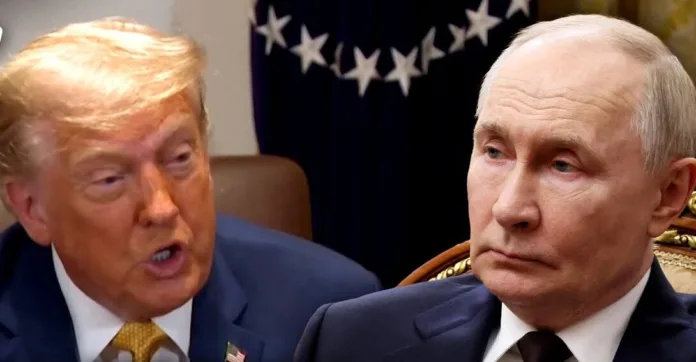Once Putin’s loudest western defender, Trump now accuses the Russian leader of stringing him along
Donald Trump has finally snapped. After years of defending Vladimir Putin — through invasion, repression, and diplomatic scandal — the US president has now publicly admitted he no longer trusts the Russian strongman.
“We get a lot of bullsh*t thrown at us by Putin, if you want to know the truth,” Trump told reporters Tuesday during a fiery White House Cabinet meeting.
Just five months ago, Trump insisted Putin “wants peace” in Ukraine and that he trusted the Kremlin leader “on this subject.” On Tuesday, that narrative collapsed.
In a stunning reversal, Trump not only abandoned his trademark both-sides equivocation on Ukraine, but also praised the “courage” of Ukrainian fighters, suggesting their resistance had earned even his grudging respect.
“Whether you think it’s unfair that we gave all that money or not, they were very brave,” Trump said. “Somebody had to operate that stuff.”
The shift signals deepening frustration inside the Oval Office. According to sources familiar with the matter, Trump feels Putin is stringing him along, failing to deliver on vague promises of negotiation or compromise, all while escalating Russia’s aggression.
That frustration boiled over after a recent call between the two leaders—meant to open new ceasefire discussions—ended with Russia launching its largest-ever drone attack on Ukraine just days later.
Trump’s shift comes as his administration reversed a brief suspension of defensive arms shipments to Ukraine. Though Trump blamed unnamed subordinates for the pause, his decision to resume support further distances him from the “blame both sides” rhetoric he long clung to.
“He’s very nice all of the time, but it turns out to be meaningless,” Trump said of Putin—an unprecedented level of public disillusionment from a president who once called the Russian invasion “genius.”
Despite these remarks, Trump stopped short of endorsing a new sanctions package backed by over two-thirds of the Senate, prompting scepticism about whether the shift is substantive or performative.
For now, observers remain wary. This wouldn’t be the first time Trump made a temporary rhetorical U-turn under pressure. After praising Putin’s “savvy” in 2022, Trump briefly condemned the invasion—only to quickly revert to softer tones.
But this time might be different.
Insiders point to Trump’s obsession with sealing a peace deal in Ukraine—a diplomatic “win” he promised on day one of his presidency. That deal remains elusive, largely because Putin refuses to compromise. According to one administration official, Trump increasingly realises his goals for Ukraine don’t align with Moscow’s ambitions.
“He thought Putin was a rational player,” the official said. “Now he’s starting to feel played.”
Domestic political pressure may also be weighing on Trump. Critics, including some within his own party, have grown louder in questioning his ongoing indulgence of authoritarian leaders. With the 2026 midterms looming, Trump may be trying to reframe himself as a pragmatic realist, rather than a gullible apologist.
State Department spokeswoman Tammy Bruce suggested Tuesday that Trump’s tone shift reflects genuine recalibration.
“He’s open-minded, but not naive,” she said. “He’s responding to what he sees. He’s principled and clear in what he wants to achieve.”
That clarity might come too late. By giving Putin the benefit of the doubt for years, Trump tied his reputation to a leader now openly defying him. If Trump can’t secure a peace deal or tame Putin, critics may accuse him not just of misjudgement—but of enabling disaster.
And if this turn proves fleeting—as past pivots have—he may lose both diplomatic credibility and political capital.
For now, the world waits. Trump’s voice has grown colder. But Putin’s war machine hasn’t missed a beat.
